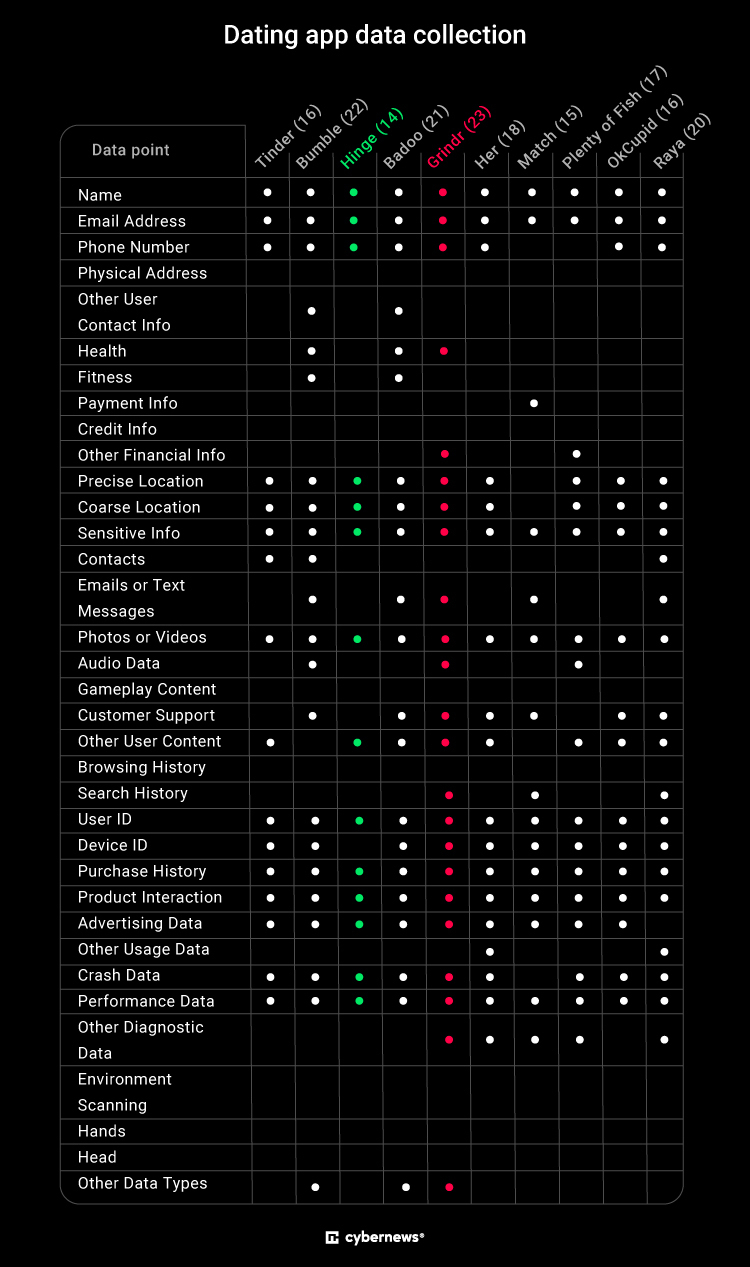
Cybernews took a deep dive into the privacy practices of 10 big-name dating apps, aided by Apple spilling the tea on their App Store privacy requirements. And, guess what? Turns out Grindr and Bumble top the list as the most voracious for user data like they’re dining at an all-you-can-eat buffet. Meanwhile, Hinge emerged as the most privacy-respecting data app for users still searching for their Valentine.
When it comes to protecting consumer’s privacy, dating apps catch a bad rap. But, not all of it is unwarranted. And when it comes to protecting consumer’s privacy, not all dating apps are created equal.
Dating apps are like nosy neighbors asking users for all of their juicy details to set up their profiles. We’re talking really sensitive data here — race or ethnicity, sexual orientation and gender identity, political and religious points of view, as well as alcohol and drug use or abuse. This data is so sensitive, it’s got its own VIP section under GDPR rules.
Now imagine if all of that information gets shared outside of the app. There’s a lot for users to be worried about when it comes to their freedom and safety.
Remember When Grindr Was Found Violating GDPR?
It was only back in 2020 that Grindr, Tinder, and OkCupid were exposed for sharing personal user information with advertisers and potentially violating GDPR by the Norwegian Consumer Council. Unsurprisingly, some of Grindr’s ad tech partners, like AppNexus, OpenX, and MoPub, were also named by NCC in the government agency’s complaint under the EU’s General Data Protection Regulation. The story ended in late 2023 when Grindr was slapped with a $6 million data-sharing fine. Ouch!
Grindr was busted for sharing GPS location, IP address, the device’s advertising ID, age, and gender, as well as other sensitive data, between July 2018 and April 2020. And, according to Cybernews’ recent analysis, where they looked into the data collection and sharing practices of 10 popular dating apps, Grindr looks like the most data-hungry offender.
Grindr is collecting 23 points of data about its users for various reasons, including app functionality, analytics, and advertising. “It links all of the collected data to user identity and tracks two types of data, namely device ID and advertising data, which it can share with other companies,” according to Cybernews.
Swipe Right for Data: Unpacking What Dating Apps Know About Love Seekers
Apple requires developers to disclose 35 types of data or privacy points their app is collecting, including contact information like name or phone number, financial information like payments or credit, and user location.
Developers have to list out the data that’s tied to users, which means any data that can be traced back to who a person is – think account, device, or something as personal as a phone number.
Every app Cybernews checked out came clean about collecting data that’s linked to identity. But there’s a plot twist: some apps play it coy, saying, ‘Yeah, we gather data, but we don’t tie it to a user.’ Four apps from Cybernews’ list are dancing this delicate dance.
Apple lays down the law here: If devs want to claim they’re not tracking users, they have to strip the data of any identifying signals like a user ID, before they even think about collecting it. And Apple’s guidelines are against app publishers trying to reconnect the dots to a user’s identity after the fact.
Six out of the ten apps in Cybernews’ analysis are collecting data that could potentially track users across other apps and websites, and might even be shared with data brokers. All of these apps are peeking into their users’ photos and videos, and they’re also pretty upfront about gathering sensitive info like sexual orientation.
For example, Cybernews reports, “Badoo users could expect their data across seven categories shared with third parties, including precise location, coarse location, email address, device ID, advertising data, other user contact data, and other data types. Meanwhile, Her app is an outlier on the list in that it tracks most of the data it collects about its users and links it to their identity.”
Hinge, Best Hope For Finding a Valentine?
For privacy-minded consumers, Hinge might be the best choice. It only collects user data across 14 types of data, which the company claims is only used to improve the app’s performance and for marketing purposes. It links most of the collected data to user identity, except for crash and performance data. The app does not track user data.
Tinder, Plenty Of Fish, and Raya also don’t track user data, but some of their data collection practices might still appear questionable to some users.
To read the full analysis, visit Cybernews.
